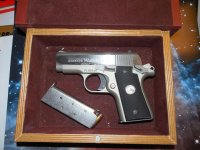I agree, it shouldn't need to be lubed in a special way.
In the case posted in #192, the fail-to-fire can't be the shooter or ammo. It has to be the gun. The shooter can't induce the firing pin to not hit the primer. It can't be the ammo because the ammo can't prevent the firing pin from hitting the primer. Sure, the primer could be seated too deeply, but that wansn't the case here.
Primer seating depth, cartridge headspacing (case mouths, where do they go?). Besides, not like the same thing hasn't happened on other guns.
In your #192, the secret is "failed to go into battery". Could be the gun (dirty chamber, weak recoil spring), could be bad ammo--American Eagle is garbage Federal--very frequently it's shooters squeezing their hands all over a tiny gun.
And again, "experienced" means nothing.
Since your argument is anecdotes, my dad's RM380, I think, has not jammed once yet, even shooting my handloads for it--100-grain plated RNFPs over 2.6 gr of AA#2.


